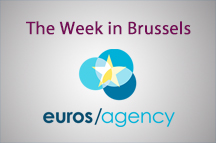 European leaders face defining “make or break” summit, amid weeks of clashes over EU migration policy, Brexit and eurozone reform.
European leaders face defining “make or break” summit, amid weeks of clashes over EU migration policy, Brexit and eurozone reform.
MIGRATION
16 EU leaders started off the week with talks that failed to reach “concrete conclusions” over a common EU migration policy approach. Politically, while the summit aimed to ease tensions, Angela Merkel needed it in order to stave off her politically-fragile coalition being upended by the issue while the new Italian Prime Minister put forwards a new 10-point plan to revise the current rules. Unfortunately, this created a huge clash between the latter and France given that President Macron wanted the populist Italian Government to remain committed to the current cause. Concluding the matter, Chancellor Merkel suggested that the way forwards was a series of bilateral agreements with the EU28. This was, however, unlikely carry favour with her coalition at home, which is expecting a pan-EU solution.
TRADE
Following the aforementioned mini-summit, therefore, populist Italian Prime Minister Giuseppe Conte refused to sign off on the EU’s statements concerning trade (and defence) until measures tackling the migration crisis were found. To note, this is Prime Minister Conte’s first EU Council, where the bar is now set for anticipating future behaviour from the eurosceptic leader. Given global trade tensions, not least due to the U.S. administration’s current stance, and the EU’s need to reduce its costs, the leaders embarked on a sleepless dinner in order to draw up a common paper reportedly acknowledging joint asylum sites, a restriction to migrant movement within the EU borders and that all measures be shared on a voluntary basis. This should now clear the way for the EU leaders to agree on working to improve the way in which the WTO functions - particularly with regards to industrial subsidies, intellectual property and forced technology transfers.
DEEPER EURO ZONE INTEGRATION
The introduction of a dedicated budget for the 19 countries that have adopted the single currency is one of the most important proposals for the French President Emmanuel Macron. However, in the EU, nothing goes according to plan. 10 days after pressing Berlin to support the French eurozone vision, Emmanuel Macron now faces major opposition from 12 EU Governments. The flagship idea of the French President - a budget for the eurozone - seems stalled in the face of opposition. The Netherlands made it clear that it does not see any point in such a move, while others, without being opposed to the idea, voiced particular concerns over the financing options put forward by Paris and Berlin. While a senior EU official acknowledged that the mother of all summits "was not entirely hopeless" it will certainly not be President Macron’s long-awaited crowning moment.
Written by Sloan Moreau, Senior Adviser & Martin Wittenberg, Managing Partner














